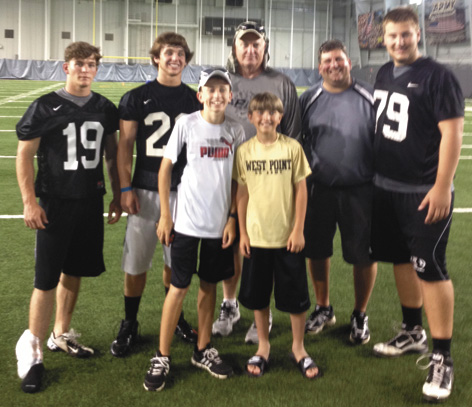By Gene Stanley/Sports Correspondent
Every summer, high school football players attend camps. For the most part, players from our area visit locales such as Tuscaloosa, Auburn, Starkville, Nashville and the like.
This summer, though, three Southside athletes had a rather unique experience – going to camp at the United States Military Academy at West Point, NY.
“One of the army recruiters wanted us to go up and see what they had to offer,” said Tyler Carr, a 6-6, 304 pounds junior-to-be who is switching from the defensive line to the offensive line for the upcoming season. “[SHS football] Coach (Marty) Smith talked to them and got it set up. I wanted to go and see what they had to say and what the place looked like.”
So for a one-day camp on May 27, Smith, Carr, rising senior Blake Devine and rising junior Holt Keeling packed up and drove north up the coast.
Seeing what it looked like proved to be a surprise for the players.
“The facilities were a whole lot nicer than I expected,” Devine said. “Everything was brand new, and we got to practice in their indoor facility.
“There were only about 70 kids there, so it wasn’t crowded at all. We got a lot of one-on-one time because of that.”
Devine is a 5-9, 170 pound running back.
After Black Knights head coach Rich Ellerson gave his welcome speech, the athletes on hand were timed and tested in running and jumping events.
Keeling made a big impression in the standing broad jump, jumping 9-11, a personal best and the longest jump the Army coaches had ever seen from a high schooler.
“My jumps were better and my running times were faster than I normally get,” said Keeling, a 5-11, 175 pound safety. “I think I was trying to show out because most of the players were from up North. It was a great opportunity to show what we could do.”
Carr also said that the trio made a good impression.
“We definitely held our own,” he said.
Smith said that even though the South always has better athletes, northern players normally have better jump results because most of the northern cities are “walking” cities while most southern players, even those in cities, tend to get in their car when they want to go somewhere. Therefore, the legs of northern players are better developed.
“The southern athletes are more athletic but they’re not trained as well, on the whole,” Smith said. “Walking does more than some people think.”
After the testing was complete, the athletes met with the position coaches for some individual and small group coaching.
Each of the Panthers said that Army’s ways are way different than anything they’ve seen before.
Carr said that offensive line coach Tom Simi taught some schemes unfamiliar to Carr.
“They run different styles of offense up north, and because of that, there are different line schemes,” Carr said. “This camp was a very valuable experience because it showed me some ways of playing that I had never thought of.”
As for Devine, getting to see what the triple option is all about showed him that he doesn’t have to necessarily run downhill at the beginning of a play.
“The option has fewer wide receivers, so you have to run in the right lanes,” he said. “I learned a bit of how to run laterally and look for the hole. Coach (Tucker Waugh) did a great job of showing us how to run like that.”
Keeling also saw some different techniques.
“It was funny because the safeties coach (Mayur Chaudhari) is the recruiter who works the South,” Keeling said. “But we ran some drills I had never seen before and they fixed my footwork. They ran a lot of routes that SEC teams don’t run. It was a great camp for learning. I know I learned and got a lot better.”
After lunch, the camp continued in the same vein.
Meanwhile, Smith was getting to see some of the public areas of the academy.
“They didn’t get to see as much as I did on the campus,” he said. “Everything is immaculate. It also helps that the coaching staff is a bunch of straight shooters. They tell you things up front.”
One of the things that had to be brought up early was the commitment of nine years. After graduating the four-year school, the new lieutenants are expected to serve five years.
That was one of the points the coaches talked about upfront.
“They’re not just coaching football,” Smith said. “They’re also preparing young men to be leaders in the military and afterward. I’ve had two players go to Navy, but I didn’t get as much sense of pride from them as I did just taking these three to West Point. It probably makes a difference that I have an uncle who was a two-star general.”
One thing that Smith pointed out to the players is that they were walking in the same place that many U.S. Presidents walked.
“What impressed me more than anything was the memorial of all the academy graduates who had died in battle,” Smith said. “It’s very impressive and is positioned overlooking the Hudson River. There were a lot of tourists there and they talked to each other at other sites, but at the memorial everyone was quiet and very reverent. It was awe-inspiring.
“The academy was very prestigious,” Carr noted. “Anyone who goes there has a bit more purpose than the average college athlete.”




